Crisis of Meaning = Crisis of Work
December 23, 2016
People were poor by today's standards, so why do people remember the plantation life fondly? The answer is simple: community, purpose, sacrifice and meaning.
Allow me to connect two apparently unconnected dots. Dot #1: The last sugar plantation in Hawaii is closing down, ending more than a century of plantation life in the 50th state.
Dot #2: a new study found that Nearly 95% of all new jobs during Obama era were part-time, or contract.
The research by economists Lawrence Katz of Harvard University and Alan Krueger at Princeton University shows that the proportion of workers throughout the U.S., during the Obama era, who were working in these kinds of temporary jobs, increased from 10.7% of the population to 15.8%. Krueger, a former chairman of the White House Council of Economic Advisers, was surprised by the finding. The disappearance of conventional full-time work, 9 a.m. to 5 p.m. work, has hit every demographic. “Workers seeking full-time, steady work have lost,” said Krueger.
While it's tempting to dismiss the plantation economy as corporate exploitation--a blatant reality in the early decades--once the I.L.W.U. represented the labor force, a more benign version emerged.
Indeed, what is striking is the nostalgia of the workers and residents for the orderly, secure life of the plantations. I attended high school in a classic plantation town in 1969-70, Lanai City, owned by Dole Pineapple, my summer employer.
Housing was cheap, work was plentiful and secure, and any married couple with plantation jobs could save enough to send their kids to college: my classmates are living proof of this.
The plantation town was not just a work place--it was a community. In the old days, bathrooms and showers were communal in sugar camps. You didn't just wave to your neighbor from your car--you shared the communal bath house.
People were poor by today's standards, so why do people remember the plantation life fondly?
The answer is simple: community, purpose, sacrifice and meaning. These are not independent dynamics--they are interwoven.
Work provided purpose and meaning, and the sacrifices made for the betterment of the next generation provides a second layer of meaning. The stable, secure community offered what every human seeks: shared purpose and friendship.
Compare this world with the insecure, isolated, atomized existence of the temporary worker in an economy that is changing fast in profound ways. Shared purpose--are you kidding? As Gustavo Tanaka observed in his essay There is something extraordinary happening in the world:
"No one can stand the (standard) employment model any longer.
We are reaching our limits. People working with big corporations can’t stand their jobs. The lack of purpose knocks on your door as if it came from inside you like a yell of despair.
People want out. They want to drop everything. Take a look on how many people are willing to risk entrepreneurship, people leaving on sabbaticals, people with work-related depression, people in burnout."
Community? People move constantly to either move up financially or to chase work. Stability is rare, ditto lasting friendship. Everything in the work world is contingent, ephemeral, and so is everything that once flowed from work: friendship, shared purpose, community.
The world of work has changed, and the rate of change is increasing. Despite the hopes of those who want to turn back the clock to the golden era of high-paying, low-skilled manufacturing jobs and an abundance of secure service-sector jobs, history doesn't have a reverse gear (tm).
The world of work is never going back to the "good old days" of 1955, 1965, 1985 or 1995.
Those hoping for history to reverse gears place their faith in these wishful-thinking fantasies:
1. That automation will create more jobs than it destroys because that's what happened in the 1st and 2nd Industrial Revolutions. The wishful thinkers expect the Digital / 4th Industrial Revolution to follow suite, but it won't: previous technological revolutions generated tens of millions of new low-skill jobs to replace the low-skill jobs that were lost to technology.
Millions of farm laborers moved to the factory floor in the 1st Industrial Revolution, and then millions of displaced factory workers moved to sales and clerk jobs in the 2nd Industrial Revolution.
Even white-collar jobs that supposedly required a college degree could be learned in a matter of hours, days or at most weeks, and little effort was required to stay current.
The Digital/4th Industrial Revolution is not creating tens of millions of low-skill jobs, and it never will. Even worse for the wishful thinking crowd, the 4th Digital Revolution is eating tech jobs along with the full spectrum of service-sector jobs.
Those expecting to replace low-skill service jobs with armies of coders will be disappointed, because coding is itself being automated.
The new jobs that are being created are few in number and highly demanding. Jobs are no longer strictly traditional boss-employee; the real growth is in peer-to-peer collaboration and what I term hybrid work performed by Mobile Creatives (see below), workers with highly developed technical/ creative/ social skillsets who are comfortable working with rapidly changing technologies, who enjoy constant learning and are highly adaptive.
The work that is being created in the Digital/4th Industrial Revolution is contingent and thus insecure. The only security that is attainable in fast-changing environments is the security offered by broad-based skillsets, adaptability, a voracious appetite for new learning and a keenly developed set of "soft skills": communication, collaboration, self-management, etc.
I cover all this in depth in my book Get a Job, Build a Real Career and Defy a Bewildering Economy.
The problem is the number of these jobs is far smaller than the number of jobs that will be eaten by software, AI and robotics. the number of workers who can transition productively to this far more demanding and insecure work environment is also much smaller than the workforce displaced by software/robotics.
In short, we need a new system to provide work, purpose and meaning; wishful thinking isn't a solution.
2. The wishful thinkers want strong corporate profits to prop up their stock market and pension funds, but they don't want corporations to do what is necessary to reap strong profits, i.e. move production of commoditized goods, services and sales channels overseas and replace human labor with cheaper automation.
You can't have it both ways.
Wishful thinkers choose to ignore the reality that roughly half of all U.S. based global corporate sales and profits are reaped overseas. It makes zero financial sense to pay a U.S. worker $25/hour, and pay the insanely expensive costs of sickcare/"healthcare" in the U.S. when the work can be done closer to the actual markets for the goods and services at a fraction of the cost.
Memo to all the armchair wishful thinkers: if you want to compete globally with a high-cost U.S. work force and no automation, be my guest. Put your own money and time at risk and go make it happen. Go hire people at top dollar and provide full benefits, and then go out and make big profits in the global marketplace.
The armchair pundits and ivory tower academics would quickly lose their shirts and come back broke. That's why they wouldn't dare risk their own security, capital and time doing what they demand of others.
3. The wishful thinkers decry the lack of "good-paying" jobs yet they refuse to look at the reasons why employing people in the traditional boss/employee hierarchy no longer makes sense. The armchair pundits and ivory tower academics have never hired even one person with their own money. These protected privileged are living in a fantasy-world of academia, think tanks and foundations, where workers are paid with state money, grants, venture capital, etc.
Inequality and the Collapse of Privilege.
As I have often noted here, Immanuel Wallerstein listed the systemic reasons why labor overhead costs will continue to rise even as wages stagnate. This means employers see total labor costs rising even if wages go nowhere: it gets more and more expensive to hire workers.
Why I Will Never Hire Anyone, Even at $1/Hour (November 10, 2015)
Then there's the staggering burden of liability in a litigious society, the costs of training and supervising ill-prepared employees and the hard-to-calculate costs of increasingly complex regulations.
4. Wishful thinkers claim we can solve the decline of the traditional work model with more education. This is also wishful thinking, as not only is the "factory model" of our higher education failing to produce workers with the requisite range of skills, the emphasis on higher education has produced an over-supply of people with college diplomas.
We need an entirely new model of education, one in which we accredit the student, not the institution, a model I describe in The Nearly Free University and the Emerging Economy: The Revolution in Higher Education.
An over-abundance of credentials pushes wages down, even for the highly educated. In the real world, even wages of the most highly educated are stagnating.
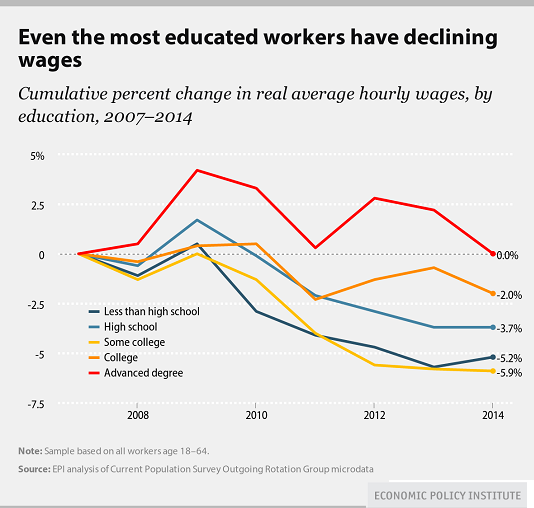
The structural changes in the world of work are visible in these charts:
The civilian participation rate is plummeting, despite the "recovery:"
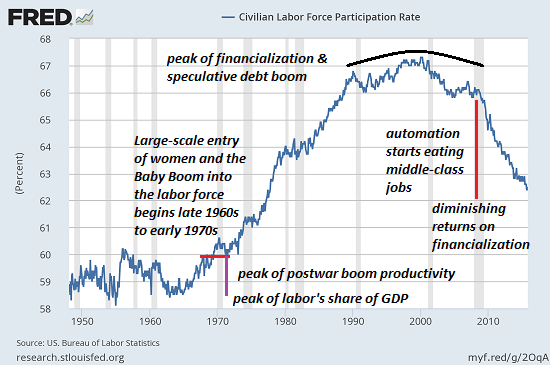
The civilian participation rate for men is in a multi-decade decline:
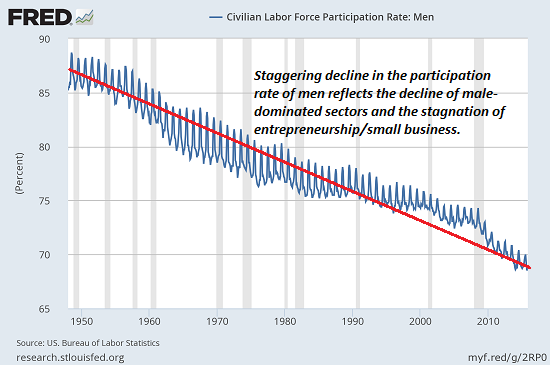
As a percentage of GDP, wages have been declining for decades.
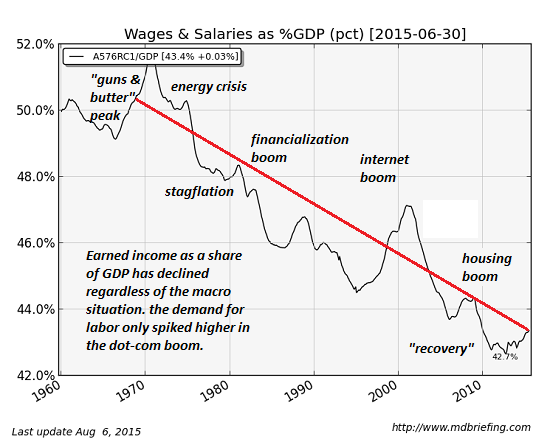
Self-employment is the wellspring of entrepreneurs and small business. As you can see, it has also been declining for decades.
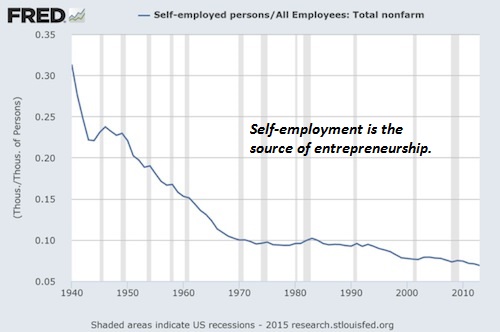
It's time to get real. Wishful thinking is not a solution. We need a new system for creating paid work, shared purpose and meaning, and I propose a complete, practical alternative system in my book A Radically Beneficial World: Automation, Technology and Creating Jobs for All.
If you're seeking the source of the epidemics of ill-health, prescription drug addiction and other social ills, look to the absence of meaningful, purposeful work.
Of related interest:
Fixing The Way We Work (44:54 podcast with Chris Martenson)
Radical Changes in Jobs Market Now & in Future (47:37 podcast with Jason Burack)
America's Nine Classes: The New Class Hierarchy (April 29, 2014)
The Changing Nature of Middle Class Work (May 8, 2014)
International Workers' Day (May 1) and the New Class: Mobile Creatives (May 1, 2014)
Join me in seeking solutions by
becoming
a $1/month patron of my work via patreon.com.
Check out both of my new books, Inequality and the Collapse of Privilege ($3.95 Kindle, $8.95 print) and Why Our Status Quo Failed and Is Beyond Reform ($3.95 Kindle, $8.95 print). For more, please visit the OTM essentials website.
NOTE: Contributions/subscriptions are acknowledged in the order received. Your name and email remain confidential and will not be given to any other individual, company or agency.
|
Thank you, Jerry T. ($10/month), for your outrageously generous pledge to this site -- I am greatly honored by your support and readership. |
Thank you, John O'B. ($5/month), for your splendidly generous pledge to this site -- I am greatly honored by your support and readership. |

Discover why I’m looking to retire in a SE Asia luxury resort for $1,200/month. |